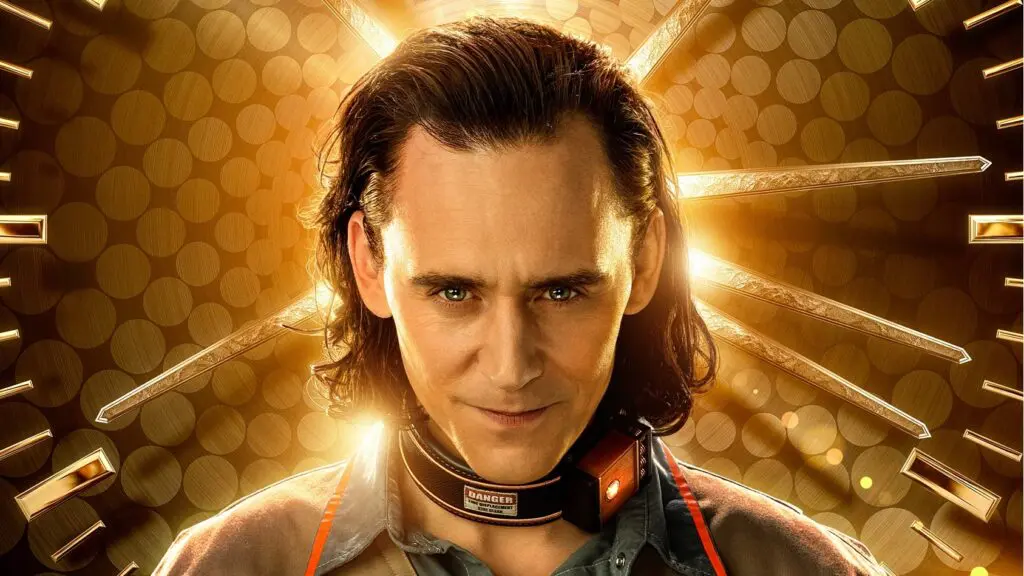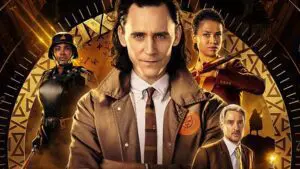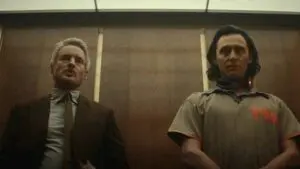Summary
“For All Time. Always” contorts the entire MCU with an exposition-heavy finale that introduces a whole new world — or perhaps several.
This recap of Loki season 1, episode 6, “For All Time. Always”, contains spoilers. It also contains an open discussion of the Loki Season 1 ending.
Everyone from Neil Armstrong to Greta Thunberg to Nelson Mandela to an entire generation of Marvel heroes gets a line in the opening of the Loki season 1 finale, “For All Time. Always”, voices overlapping and sentiments blending, though it’s all in service of the same idea — everything that has happened, and that will happen, is part of the same, some might call it sacred, timeline. Our myths and our heroes are interchangeable; our stories echo on and on. Perhaps they echo all the way to the fractured landscape that Loki and Sylvie find themselves in, that featureless place beyond the Void at the end of time, a teetering Citadel where they’re greeted by… Miss Minutes? I knew there was something suspicious about her!
He is impressed. He who remains. He created and controls all, apparently, and wants to offer these two a deal — they can be reinserted back into the timeline in a way that won’t disrupt things, though disruption sounds like a pretty subjective concept. It’s a compelling pitch all the same. How would you like to win the Battle of New York? How would you like to kill Thanos? Take the throne of Asgard? To Sylvie: How would you like to wake up tomorrow with a lifetime of happy memories? How would they both like to be together on the timeline. The life they’ve always wanted! Well, since a few episodes back, anyway.
It doesn’t take. You can’t kid a couple of kidders. And besides, wouldn’t make for much of a finale, would it?
The next we see of Miss Minutes in Loki episode 6, she’s delivering files to Ravonna Renslayer, and not the ones she asked for, apparently. “He” thinks those will be more useful. He who remains. Though, as Sylvie eloquently puts it when we cut back to the Citadel, not for much longer.
He who remains is… Jonathan Majors. Kang the Conqueror, introduced in a tasteful robe, munching on an apple, but a brief bout of teleporting when the Lokis try to kill him proves he’s not quite the aw-shucks normal guy he’s pretending to be. But we’re taking our time with him, so instead, we cut back to the TVA headquarters, where Mobius is confronting Ravonna. She tries to summon one of the Minutemen for backup, but uh-oh, turns out Hunter B-15 is back in the Fremont, Ohio of 2018, where Ravonna is a humble schoolteacher with no idea what’s going on. Looks like B-15 is proving a point to the other TVA employees that they’ve been fed a fiction.
The problem with Loki and Sylvie is that they’re being fed the truth. What they thought was their grand act of rebellion against the timeline was really them walking a preordained path — a path laid by Kang, who has a book full of scripts for everything that’s going to happen. That’s why he can move out of the way every time they try and kill him. That’s how he knows where they have been, what they have experienced; why he’s privy to the quiet, intimate moments they shared. He has seen it all. He knows it all. And everything he has written must happen. So, now what?
Loki season 1, episode 6 seems as good a time as any to raise the notion of free will. Mobius believes the TVA can’t take that away from people. Ravonna believes that the only person who truly has it is the one in charge. She’s nevertheless going to go in search of it, though. After Mobius tries to prune her, she disarms him and nips through a TemPad portal. Are we to assume, then, given her belief that choice is a privilege only of the powerful, that her search for free will is really a search for power and control? Is she trying to be the one in charge?
Speaking of the one in charge, Kang. Or is it Kang? Loki and Sylvie ask his name, and he alludes to having been called many in his time, a conqueror included — a bit of emphasis there — but that ultimately, the name isn’t important. Backstory is! According to him, a variant of himself on 31st Century Earth was a scientist and discovered many universes stacked atop his own. At the same time, other versions of himself were discovering the same thing, and for a time there was “narcissistic, self-congratulatory peace.” They shared compliments and technology and knowledge to improve each other’s universes. But not all the variants thought this way. Some saw new universes as new lands to be conquered — there’s that word again! — and the peace between realities erupted into all-out war, each reality fighting to preserve their universe and annihilate the others. That original variant encountered Alioth, a beast created by all the rifts in time that could consume time and space itself. Kang experimented on Alioth and weaponized it to end the Multiversal War. The TVA was created in the aftermath to manage the flow of isolated time and prevent any further branches. (It’s amazing how interesting Jonathan Majors can make exposition, isn’t it?)
Kang acknowledges pretty openly that he might seem like a villain — but he warns that if they think he’s evil, they should meet his variants. Here’s his pitch: Loki and Sylvie can depose him and replace him with an infinite number of him, many far worse, or they can take his place and take control of the timeline while he retires in peace. That’s what all this is. A job interview, basically. A matter of succession. Kang reckons they’re all villains, that they’ve all done terrible things, but now they have the chance to do them for a good reason. But there’s a rumble in the distance, and a worried-looking Kang says rather ominously, “We’ve just crossed the threshold.” Whatever that means.
As it turns out, Kang told a little fib. He did know everything that happened, and that was going to happen, until about ten seconds ago. But now he has no idea. We see branches in the timeline beginning to sprout. And Loki believes him. This turns out to be a bit of a problem since Sylvie doesn’t — she wants to kill him and give people their free will back, but Loki thinks doing so might unleash something worse. Of course, Sylvie assumes Loki just wants the throne for himself, and of course, Loki is offended by the accusation after all they’ve been through. But they’re the same person, aren’t they? Why aren’t they seeing this the same way? “Because you can’t trust,” says Loki, “And I can’t be trusted.” So, they fight instead. It’s like Anakin and Obi-Wan all over again! It’s a cool clash. Sylvie is a bit better fighter, but Loki is a slicker trickster, and he’s eventually able to talk her down: “I’ve been where you are. I’ve felt how you feel.” And just like that, they kiss! And… she pushes him through a portal opened up by Kang’s TemPad. They’re not the same after all. Left alone with Kang, she stabs him as he laughingly states, “I’ll see you soon.” Through his window, we see the timeline crackle and branch, splitting off into many tendrils and realities. Ladies and gentlemen, I think we have our Marvel Multiverse.
Mobius and Hunter B-15 watch this development occur on the TVA’s monitor. “For All Time. Always”, the title of Loki episode 6, the TVA’s motto, is what they say to one another while facing the prospect of their new realities. Loki, meanwhile, is stricken with grief, but then stiffened by resolve. He runs and tells Mobius and Hunter B-15 what happened with Kang and insists they need to prepare for war. But Mobius doesn’t recognize him. That’s when he notices, just to his left, a statue of Kang.
A final scene in the credits stamps a welcome message on Loki’s case file: The show will return for a second season.




